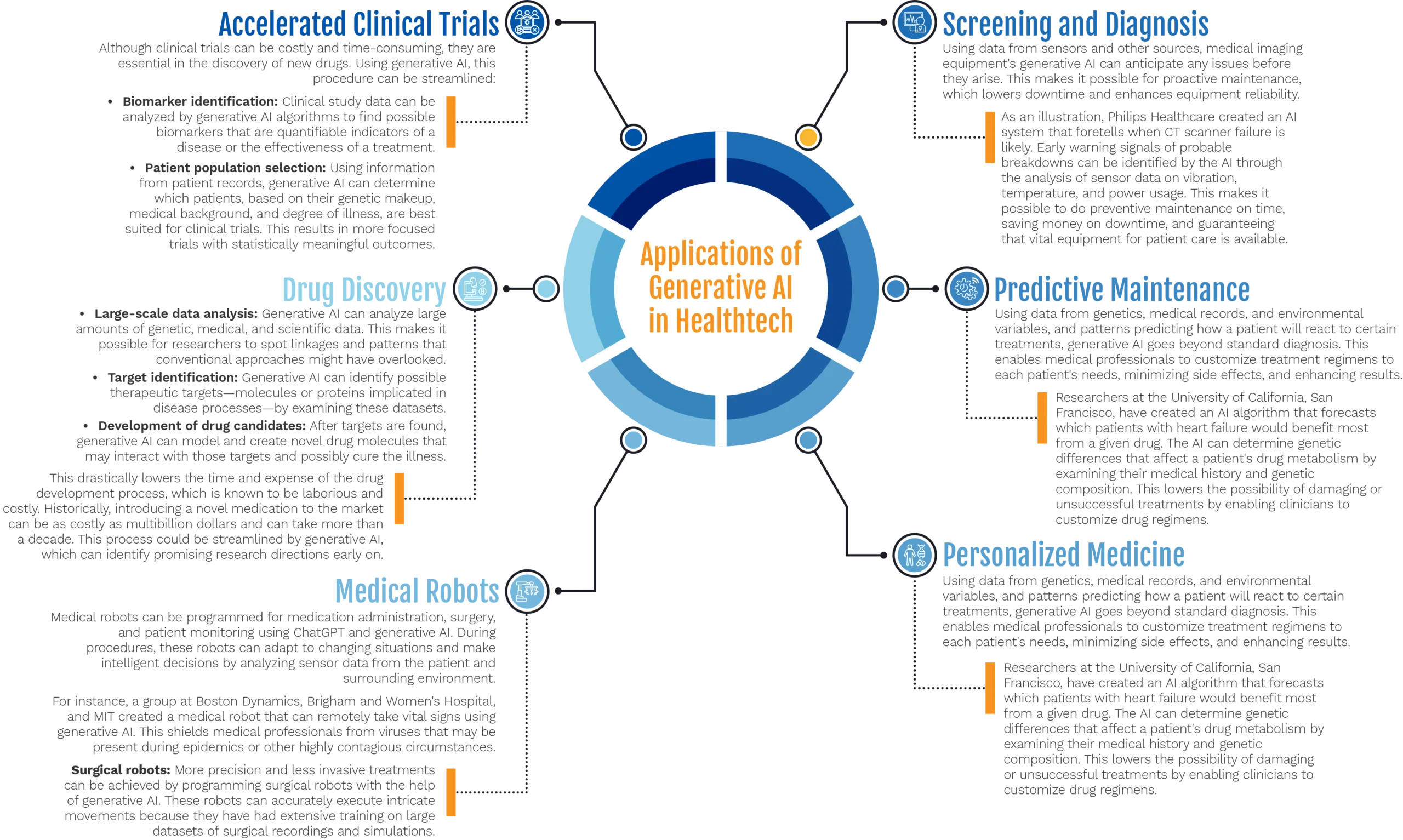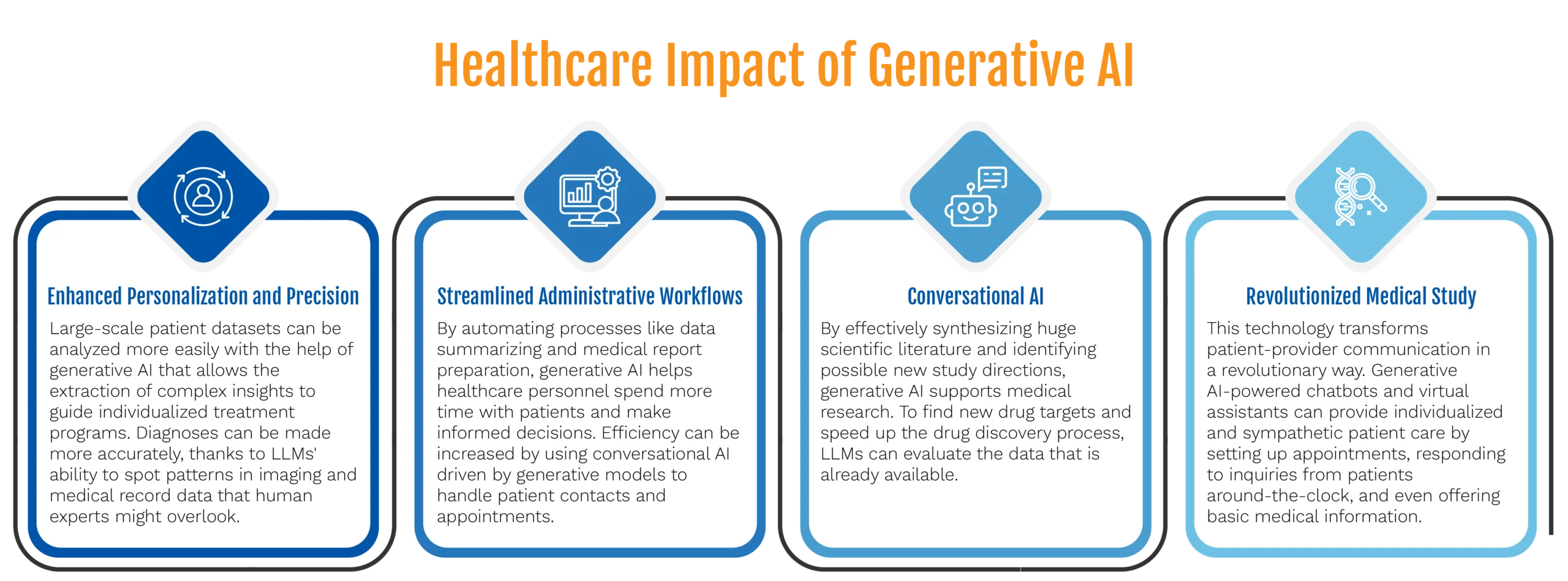The healthcare sector is increasing system efficiency and improving patient experiences by utilizing technology. The application of generative Artificial Intelligence (AI) that generates fresh data by using sophisticated Machine Learning (ML) methods like Large Language Models (LLMs) and Generative Adversarial Networks (GANs), is a significant advancement. For applications like creating medical reports, LLMs evaluate large amounts of textual data, and GANs use adversarial methods to improve data realism. The use of generative AI has revolutionized medical research, streamlined workflows, and enhanced customization. Better diagnostics, predictive maintenance, personalized treatment, medical robots, drug development, and expedited clinical trials are some of the applications in health tech that can ultimately transform patient care with more accuracy and efficiency.
By leveraging technology, the healthcare and medical industries are enhancing patient experiences and increasing system efficiency. Notably, the implementation of AI, particularly generative AI, in healthcare is proving to be especially impactful.
Generative AI: What Is It?
Generative AI refers to artificial intelligence systems that use sophisticated machine learning methods, such as Large Language Models (LLMs) and Generative Adversarial Networks (GANs), to generate new and unique data. These systems can produce imaginative and realistic writing, photos, films, and other media by analyzing and learning from large datasets.
Large Language Models (LLMs): AI models that handle and interpret vast volumes of textual data. They are perfect for jobs like creating medical reports because they can provide logical and contextually relevant content.
Generative Adversarial Networks (GANs): A discriminator and a generator are two competitive neural networks that make up a GAN. While the discriminator tries to separate genuine data from produced data, the generator produces new data. This adversarial process enhances the generator’s capabilities, enabling it to produce increasingly realistic outputs.
Healthcare Impact of Generative AI
- Enhanced Personalization and Precision: Large-scale patient datasets can be analyzed more easily with the help of generative AI that allows the extraction of complex insights to guide individualized treatment programs. Diagnoses can be made more accurately, thanks to LLMs’ ability to spot patterns in imaging and medical record data that human experts might overlook.
- Streamlined Administrative Workflows: By automating processes like data summarizing and medical report preparation, generative AI helps healthcare personnel spend more time with patients and make informed decisions. Efficiency can be increased by using conversational AI driven by generative models to handle patient contacts and appointments.
- Revolutionized Medical study: By effectively synthesizing huge scientific literature and identifying possible new study directions, generative AI supports medical research. To find new drug targets and speed up the drug discovery process, LLMs can evaluate the data that is already available.
- Conversational AI: This technology transforms patient-provider communication in a revolutionary way. Generative AI-powered chatbots and virtual assistants can provide individualized and sympathetic patient care by setting up appointments, responding to inquiries from patients around-the-clock, and even offering basic medical information.
Applications of Generative AI in Healthtech

-
Screening and Diagnosis:
Computational intelligence (AI) algorithms can analyze extensive volumes of medical data, including photographs, to uncover patterns and connections that might be missed by medical professionals. This increases the accuracy of diagnosis and enables early disease detection.
For example, researchers at Stanford University created an AI system that examines more than 130,000 photos of skin lesions to diagnose skin cancer with dermatologist-level precision. Subtle alterations in hue, feel, and form that would be challenging for even skilled dermatologists to recognize might be identified by the algorithm.
-
Predictive Maintenance:
Using data from sensors and other sources, medical imaging equipment’s generative AI can anticipate any issues before they arise. This makes it possible for proactive maintenance, which lowers downtime and enhances equipment reliability.
As an illustration, Philips Healthcare created an AI system that foretells when CT scanner failure is likely. Early warning signals of probable breakdowns can be identified by the AI through the analysis of sensor data on vibration, temperature, and power usage. This makes it possible to do preventive maintenance on time, saving money on downtime, and guaranteeing that vital equipment for patient care is available.
-
Personalized Medicine:
Using data from genetics, medical records, and environmental variables, and patterns predicting how a patient will react to certain treatments, generative AI goes beyond standard diagnosis. This enables medical professionals to customize treatment regimens to each patient’s needs, minimizing side effects, and enhancing results.
Researchers at the University of California, San Francisco, have created an AI algorithm that forecasts which patients with heart failure would benefit most from a given drug. The AI can determine genetic differences that affect a patient’s drug metabolism by examining their medical history and genetic composition. This lowers the possibility of damaging or unsuccessful treatments by enabling clinicians to customize drug regimens.
-
Medical Robots:
Medical robots can be programmed for medication administration, surgery, and patient monitoring using ChatGPT and generative AI. During procedures, these robots can adapt to changing situations and make intelligent decisions by analyzing sensor data from the patient and surrounding environment.
For instance, a group at Boston Dynamics, Brigham and Women’s Hospital, and MIT created a medical robot that can remotely take vital signs using generative AI. This shields medical professionals from viruses that may be present during epidemics or other highly contagious circumstances.
-
- Surgical robots: More precision and less invasive treatments can be achieved by programming surgical robots with the help of generative AI. These robots can accurately execute intricate movements because they have had extensive training on large datasets of surgical recordings and simulations
- Surgical robots: More precision and less invasive treatments can be achieved by programming surgical robots with the help of generative AI. These robots can accurately execute intricate movements because they have had extensive training on large datasets of surgical recordings and simulations
-
Drug Discovery:
-
- Large-scale data analysis: Generative AI can analyze large amounts of genetic, medical, and scientific data. This makes it possible for researchers to spot linkages and patterns that conventional approaches might have overlooked.
-
- Target identification: Generative AI can identify possible therapeutic targets—molecules or proteins implicated in disease processes—by examining these datasets.
-
- Development of drug candidates: After targets are found, generative AI can model and create novel drug molecules that may interact with those targets and possibly cure the illness.
This drastically lowers the time and expense of the drug development process, which is known to be laborious and costly. Historically, introducing a novel medication to the market can be as costly as multibillion dollars and can take more than a decade. This process could be streamlined by generative AI, which can identify promising research directions early on.
-
Accelerated Clinical Trials:
Although clinical trials can be costly and time-consuming, they are essential in the discovery of new drugs. Using generative AI, this procedure can be streamlined:
-
- Biomarker identification: Clinical study data can be analyzed by generative AI algorithms to find possible biomarkers that are quantifiable indicators of a disease or the effectiveness of a treatment.
-
- Patient population selection: Using information from patient records, generative AI can determine which patients, based on their genetic makeup, medical background, and degree of illness, are best suited for clinical trials. This results in more focused trials with statistically meaningful outcomes.
Bottomline
Healthcare is changing because of generative AI’s increased precision, effectiveness, and personalization. Large language models and generative adversarial networks that examine extensive volumes of data to find patterns, automate processes, and speed up research, are used to accomplish this. Drug research, surgery, treatment planning, and diagnosis are all being enhanced by generative AI. All things considered; generative AI holds significant promise for improving patient care delivery.














